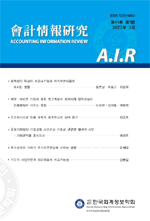- 영문명
- The Effect of Corrections of Annual Reports on Credit Ratings
- 발행기관
- 한국회계정보학회
- 저자명
- 홍가연(Ga-yeon Hong) 이현경(Hyun-Kyung Lee) 김성환(Sung-Hwan Kim)
- 간행물 정보
- 『회계정보연구』제43권 제3호, 103~130쪽, 전체 28쪽
- 주제분류
- 경제경영 > 회계학
- 파일형태
- 발행일자
- 2025.09.30
6,160원
구매일시로부터 72시간 이내에 다운로드 가능합니다.
이 학술논문 정보는 (주)교보문고와 각 발행기관 사이에 저작물 이용 계약이 체결된 것으로, 교보문고를 통해 제공되고 있습니다.

국문 초록
[연구목적] 본 연구는 사업보고서 기재정정이 신용등급에 미치는 영향을 분석하였다. 신용평가사는 사업보고서 기재정정으로 인해 공시품질이 저하되는 경우 투자자의 역선택 위험과 정보위험을 반영하여 신용등급을 낮게 산정할 수 있다. 또한 소속시장과 재무건전성에 따라 사업보고서 기재정정이 신용등급에 다르게 반영되는지를 확인하였다.
[연구방법] 2013년부터 2023년까지 코스피시장과 코스닥시장에 상장된 2,608 기업-연도를 대상으로 실증분석을 수행하였다.
[연구결과] 실증분석 결과, 사업보고서 기재정정은 신용등급과 유의한 음(-)의 관계를 가지는 것으로 나타났다. 이는 신용평가사가 신용등급을 평가할 때 활용하는 사업보고서에 정정이 있을 경우, 역선택 위험과 정보 위험을 고려하여 신용등급을 낮게 산정한다는 것을 의미한다. 또한 사업보고서 기재정정과 신용등급 간의 음(-)의 관계가 코스피 기업에서 더 강화되는 것으로 나타났다. 코스피 기업인 경우, 신용평가사는 공시품질에 대한 높은 신뢰를 가지지만, 사업보고서 기재정정으로 인해 공시품질이 저하되면 신뢰가 크게 훼손되므로 신용등급이 더 낮아짐을 의미한다. 그리고 사업보고서 기재정정과 신용등급 간의 음(-)의 관계가 재무건전성이 낮은 기업에서 강화되는 것으로 나타났다. 재무건전성이 낮은 기업이 사업보고서를 기재정정하는 경우, 신용평가사는 재무건전성을 고려하여 신용등급을 더 낮게 산정함을 의미한다.
[연구의 시사점] 본 연구는 사업보고서의 신뢰성을 높이기 위해서 기재정정이 빈번한 기업들과 환경 및 특성요인을 관리하는 정책적인 규제에 참고될 수 있으며, 투자자와 채권자는 사업보고서 기재정정이 빈번히 발생하는 기업에 대해 충분한 관심을 기울여야 한다는 시사점을 제공한다.
영문 초록
[Purpose] This study analyzes the impact of corrections in annual reports on credit ratings. Credit rating agencies are likely to assign lower credit ratings when the quality of disclosures decreases due to corrections in annual reports, reflecting the investor’s adverse selection risk and information risk. Additionally, the study examines whether the impact of corrections in annual reports on credit ratings varies by market affiliation and financial soundness.
[Methodology] Empirical analysis was conducted on a sample of 2,608 firm-year observations of companies listed on the KOSPI and KOSDAQ markets from 2013 to 2023.
[Findings] The results indicate that corrections of annual reports have a significant negative relationship with credit ratings. This implies that when there are corrections in the annual reports used by credit rating agencies to assess credit ratings, they consider adverse selection risk and information risk, leading to lower credit ratings. Additionally, the negative relationship between corrections of annual reports and credit ratings is found to be stronger for KOSPI firms. For companies in the KOSPI market, credit rating agencies place high value on the quality of disclosures;however, when the quality of disclosures decreases due to corrections of annual reports, it significantly undermines their trust, resulting in lower credit ratings. Furthermore, the negative relationship between corrections of annual reports and credit ratings is also strengthened for firms with lower financial soundness. When companies with low financial soundness have corrections in their annual reports, the quality of disclosures is further diminished, leading credit rating agencies to reflect this credit risk by assigning lower credit ratings.
[Implications] This study may inform regulatory policies aimed at managing companies with frequent corrections of annual reports and relevant environmental and characteristic factors. Additionally, it suggests that investors and creditors should pay sufficient attention to companies where corrections of annual reports occur frequently.
목차
Ⅰ. 서 론
Ⅱ. 이론적 배경과 선행연구
Ⅲ. 가설 설정
Ⅳ. 연구 방법
Ⅴ. 실증 결과
Ⅵ. 결론 및 시사점
참고문헌
키워드
해당간행물 수록 논문
참고문헌
교보eBook 첫 방문을 환영 합니다!

신규가입 혜택 지급이 완료 되었습니다.
바로 사용 가능한 교보e캐시 1,000원 (유효기간 7일)
지금 바로 교보eBook의 다양한 콘텐츠를 이용해 보세요!



